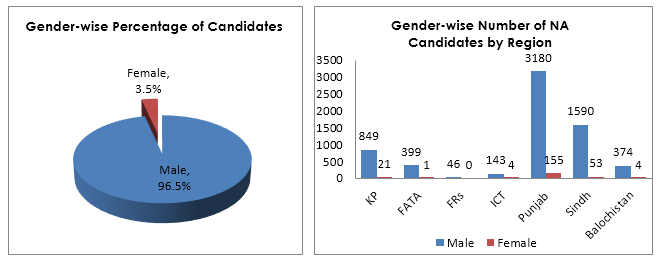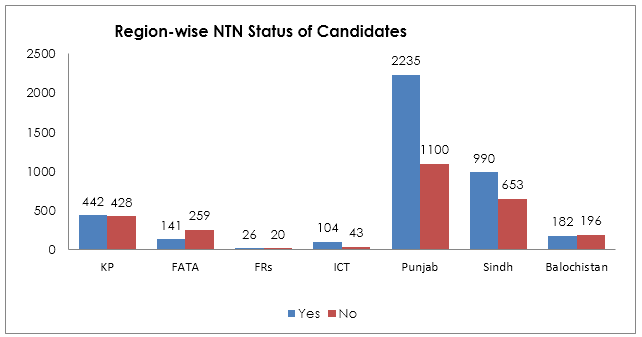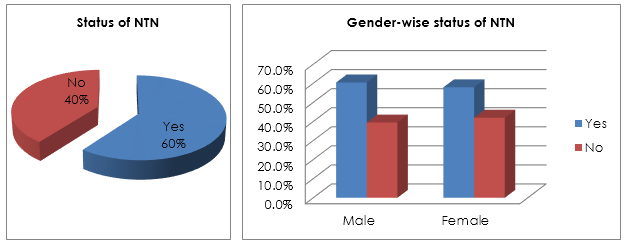Summary
The Election Commission of Pakistan (ECP) has published a list of candidates who have submitted nomination papers for contesting National Assembly constituencies for the 2013 General Election. The profile of every candidate contains a form from the Federal Board of Revenue (FBR), mentioning the National Tax Number (NTN) and the status of the candidate. The Free and Fair Election Network (FAFEN) has obtained the NTN data of all aspiring candidates from the ECP website.
ECP data indicates that only 4,120 candidates (60.4%) possess their NTN certificates, while 2,699 (39.6%) are not registered taxpayers. Gender-wise, 2,599 of 6,581 male candidates (39.5%) and 100 of 238 female candidates (42%) do not have NTN certificates. Out of 6,819 candidates, only 238 are female (3.5%), while the remaining 6,581 are male (96.5%).\
Region-wise Number of NA Candidates
According to the ECP’s data, a total of 6,819 candidates are eligible to contest the elections on general National Assembly seats in 272 constituencies. A total of 3,335 candidates (49% of the total) have filed their candidacy from Punjab, followed by Sindh (1,643 or 24%), Khyber Pakhtunkhwa (KP) (870 or 13%), Federally Administered Tribal Areas (FATA) (400 or 6%), Balochistan (378 or 6%), Islamabad Capital Territory (ICT) (147 or 2%) and the Frontier Regions (FRs) (46 or 1%).
| Number of NA Candidates, Region-wise | ||
| Region | Number of NA Candidates | Percentage |
| FRs | 46 | 1% |
| ICT | 147 | 2% |
| Balochistan | 378 | 6% |
| FATA | 400 | 6% |
| KP | 870 | 13% |
| Sindh | 1,643 | 24% |
| Punjab | 3,335 | 49% |
| Total | 6,819 | 100% |
Gender-wise Number of NA Candidates per Region
Out of a total of 6,819 candidates, only 238 (3.5%) are women, while the remaining 6,581 (96.5%) are male candidates. The region-wise distribution of male and female candidates is shown in the table below:
| Gender-Wise Number of NA Candidates by Region | |||
| Region | Male | Female | Total |
| FRs | 46 | 0 | 46 |
| FATA | 399 | 1 | 400 |
| ICT | 143 | 4 | 147 |
| Balochistan | 374 | 4 | 378 |
| KP | 849 | 21 | 870 |
| Sindh | 1,590 | 53 | 1,643 |
| Punjab | 3,180 | 155 | 3,335 |
| Total | 6,581 | 238 | 6,819 |
| Percent | 96.5% | 3.5% | 100% |

Region-wise NTN Status of Candidates
| Region-wise NTN Status of Candidates | ||||
| Region | Yes | No | Total | % w/o NTN |
| FRs | 26 | 20 | 46 | 44% |
| ICT | 104 | 43 | 147 | 29% |
| FATA | 141 | 259 | 400 | 65% |
| Balochistan | 182 | 196 | 378 | 52% |
| KP | 442 | 428 | 870 | 49% |
| Sindh | 990 | 653 | 1,643 | 40% |
| Punjab | 2,235 | 1,100 | 3,335 | 33% |
| Total | 4,120 | 2,699 | 6,819 | 39.6% |
| Percentage | 60.4% | 39.6% | 100% | |
Out of a total of 6,819 candidates, 4,120 (60.4%) have NTN certificates, while the remaining 2,699 (39.6%) have no NTNs.
Region-wise, FATA has the highest percentage of candidates (259 out of 400, or 65%) having no NTNs, followed by Balochistan (196 out of 378, or 52%), KP (428 out of 870, or 49%), Frontier Regions (20 out of 46, or 44%), Sindh (653 out of 1,643, or 40%), Punjab (1,100 out of 3,335, or 33%) and ICT (43 out of 147, or 29%).

Gender-wise NTN Status of Candidates
As many as 3,982 (60.5%) male candidates have got their NTN certificates, while the remaining 2,599 (39.5%) do not have NTNs.
Out of the 238 female candidates, 138 (58%) have NTNs, whereas the remaining 100 (42%) have no NTNs.

| About FAFEN
The Free and Fair Election Network (FAFEN), established in 2006, is a coalition of 42 leading civil society organizations working to strengthen all forms of democratic accountabilities in Pakistan. Governed by the Trust for Democratic Education and Accountability (TDEA), FAFEN also implements robust programs in-between elections related to monitoring parliamentary affairs, connecting constituents to their elected representatives, monitoring the performance of public and elected institutions and advocating electoral and democratic reforms. |
FAFEN Election Program
FAFEN is implementing a long-term election observation program nationwide, including both pre- and post-electoral processes. FAFEN has deployed almost 400 District and Constituency Long-Term Observers (DLTOs and CLTOs) across the country to monitor all phases of elections. In addition, FAFEN will deploy more than 43,000 trained, non-partisan citizens to monitor polling stations across the country on Election Day. FAFEN’s 10-month observation process, which began on February 1, 2013, helps keep all election stakeholders informed on issues relevant to fairness and transparency at every stage of the election process.
FAFEN Election Observation Methodology
FAFEN’s election observation activities are based on the Constitution and laws of Pakistan, global best practice standards for elections, as well as the legal obligations of the International Covenant on Civil and Political Rights (ICCPR), ratified by Pakistan in 2010. All FAFEN observers adhere to the Election Commission of Pakistan’s (ECP) Code of Conduct for National Observers as well as the Global Principles for Non-Partisan Election Observation and Monitoring by Citizen Organizations (April 2012). FAFEN LTOs use standardized checklists to report electronically to the FAFEN Election Observation Secretariat in Islamabad regularly. FAFEN compiles data and information from around the country to issue regular thematic updates for the consideration of voters and election stakeholders.
FAFEN LTOs monitor and report on the activities of District Election Commissioners (DECs) and other ECP officials related to preparations for elections, including appointment and training of election officials, the process of candidate nominations. LTOs also observe compliance with the ECP’s Code of Conduct for political parties and candidates, and compliance of the executive branch with legal responsibilities and ECP regulations, including restrictions on transfers of civil service personnel and initiation of new development schemes. In addition, LTOs monitor political and electoral intimidation and violence, the actions of the police and other security forces, and the overall political environment during the pre-election period.
For complete report, click here






